![]()
MEANING: you can do or achieve anything you like; the world is yours to enjoy
IN CONTEXT: If you can just finish your law degree, the world is your oyster.
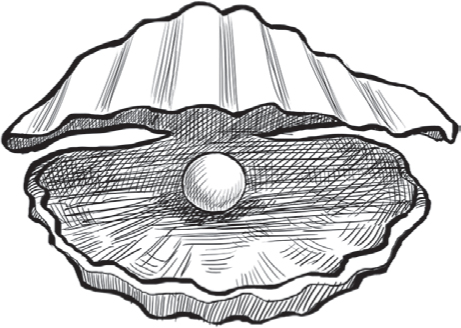
The world is your oyster is another Shakespearean expression. It began with his 1602 play The Merry Wives of Windsor. In a conversation between two of the characters, Falstaff and Pistol, Falstaff says, “I will not lend thee a penny.” “Why then, the world’s mine oyster,” replies Pistol, “which I with sword shall open.” The metaphoric implication is that Pistol is going to use his sword to open an oyster to get to the pearl inside and have his fortune.
![]()
MEANING: an action or comment that makes an already-bad situation even worse
IN CONTEXT: After losing his job, Nick’s severance pay was also cut, which added insult to injury.
To add insult to injury dates back to 25 BC and is derived from the fables of Phaedrus, a writer in ancient Rome. He told the story of The Bald Man and the Fly, in which a fly stings a bald man on top of his head. The man swats at the fly, attempting to kill it, but the fly moves away and the man hits himself on the head instead. The man not only gets bitten, but he makes it worse by hitting his head. “You wished to kill me for a touch,” the fly says. “What will you do to yourself since you have added insult to injury?” The phrase had passed into English by the mid-1700s.
![]()
MEANING: a rogue who avoids getting into trouble for his crimes through devious means
IN CONTEXT: Jake was responsible for the graffiti but he convinced the teacher he didn’t do it. That boy is a real artful dodger.
Artful dodger derives from the Charles Dickens novel Oliver Twist. Published in 1838, the novel was met with immediate critical and popular acclaim. One of the characters in the book is Jack Dawkins, a cunning pickpocket and member of Fagin’s gang of thieves. As part of the story, Dickens nicknames Dawkins the Artful Dodger, and the expression has been used from that time to describe any wily ruffian.
![]()
MEANING: the largest part of something
IN CONTEXT: We had done the same amount of work for the presentation, but Courtney took the lion’s share of the credit because she is so outgoing.
The lion’s share derives from one of Aesop’s fables, which now bears that name. It tells the story of a lion, a fox, a wolf, and an ass who kill a stag to eat. The bounty is divided into quarters to share equally, but before they start eating, the lion claims the first portion because he is the king of the jungle. He then claims the second portion because he is the strongest, then the third portion because he is the most courageous. The other animals are left with the last quarter to eat, but they are too afraid to claim it with the lion standing over them. So depending on the version of the story, the lion’s share is either three quarters, or everything.
![]()
MEANING: to try any method to help a situation, even if success is unlikely
IN CONTEXT: She’s hoping the new herbal treatment will help her illness, but I think she’s clutching at straws.
Sometimes said with “grasping,” clutching at straws originated with the English philosopher Sir Thomas More, who was beheaded for refusing to acknowledge King Henry VIII as the Supreme Head of the Church of England. While awaiting his execution, More wrote Dialogue of Comfort Against Tribulation. Published in 1534, the book is a fictional account of More’s life. In it he writes that “a man in peril of drowning catchest whatsoever cometh next to hand…be it never so simple a stick.” By the 19th century the expression had developed from “catch” and “stick” to clutching at straws.
![]()
MEANING: an attitude of sheltered retreat, remote from the real world and everyday affairs
IN CONTEXT: Having been an academic for years and living in an ivory tower, Joe couldn’t handle his practical role in the new company.
To live in an ivory tower has its origins in the world of literature. As with a number of other expressions, it has French beginnings and derives from a poem called “Pensees d’Août” (“Thoughts of August”). This was written in 1837 by the critic Charles Sainte-Beuve and is about a man named Alfred de Vigny. De Vigny was a poet who lived a withdrawn and sheltered life away from the harsh realities of the world. Sainte-Beuve describes de Vigny’s life as isolated, writing that he lived in a secluded tour d’ivoire, which translates to ivory tower. The phrase came to apply to intellectuals and academics who were thought to be removed from the real world.
![]()
MEANING: to do something entirely without reservation; to hold back nothing
IN CONTEXT: If you can afford to build such an expensive house, you might as well go the whole hog and get a swimming pool as well.
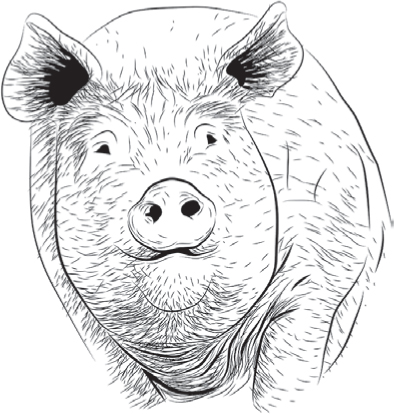
Go the whole hog was first recorded by the Englishman William Cowper in his 1779 poem “The Love of the World Reproved; or Hypocrisy Detested.” The poem mocks Muslims over their supposed ambiguity on the restrictions against eating pork. In it, Cowper mocks them, suggesting that while sampling each part of the pig to test which is not permissible to eat, the whole hog is eaten: “But for one piece they thought it hard, from the whole hog to be debarred.” The expression entered the mainstream with 18th-century meat vendors in America. Butchers offered meat for sale by the pound, but a discounted rate was charged if the whole animal was purchased. Andrew Jackson then used the phrase as a slogan in his 1828 presidential campaign, which he eventually won, to refer to “going all the way.”
![]()
MEANING: wild and erratic things occurred
IN CONTEXT: When the teacher left the classroom for ten minutes all hell broke loose.
All hell broke loose has literary origins. The expression comes from John Milton’s epic poem Paradise Lost. Published in ten volumes in 1667, the poem tells the biblical tale of the Garden of Eden. In one part, just before he casts him out of the Garden, the angel Gabriel asks Satan why he had traveled alone and hadn’t been joined by the other inhabitants of Hell. Gabriel poses the question as, “Wherefore with thee came not all hell broke loose?”
![]()
MEANING: disgraced and out of favor, usually a husband with a wife
IN CONTEXT: I was in the doghouse because I’d been out drinking until late the night before.
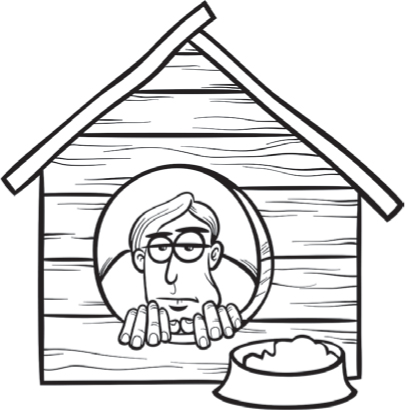
In the doghouse is another phrase with literary origins. It derives from J. M. Barrie’s 1904 book Peter Pan. Mr. Darling, the children’s father in the book, is particularly unpleasant to Nana, the family dog. His children then fly off with Peter Pan, and as a punishment for his behavior to Nana, Mr. Darling’s wife sends him to live in the doghouse until the children return from Neverland. Peter Pan was a very popular book and, as a result, the expression quickly came into widespread usage.
![]()
MEANING: acting in a jealous way after a disappointment
IN CONTEXT: She was desperate to make the team, but when she didn’t, she had sour grapes and pretended like she didn’t care.
Sour grapes is one of a number of expressions attributed to Aesop, the ancient Greek writer. In his fable “The Fox and the Grapes,” a hungry fox sees some ripe grapes hanging from a trellised vine. The fox uses all of its cunning to get at them, but eventually tires and is unsuccessful. Knowing that it won’t be able to get the grapes, the embittered fox says that it didn’t really want them anyway, declaring, “the grapes are sour and not ripe as I thought.”
![]()
MEANING: to change one’s mind; be inconsistent
IN CONTEXT: Mike keeps talking about building a new house but he’s blowing hot and cold on the topic.
Blowing hot and cold derives from classical mythology. It comes from one of the fables of Aesop, the ancient Greek writer from 570 BC. It tells the story of a man who meets a satyr (a mythical beast that is part-man and part-goat) on a winter’s day. At first the man blew on his hands to warm them up. The satyr then invited the man to his house and gave him some porridge. The man blew on the porridge to cool it down. The satyr was aghast. “Out you go,” he said. “I will have naught to do with a man who can blow hot and cold with the same breath.” The expression was being used figuratively by the 17th century. The controversial English churchman, William Chillingworth, referred to the phrase in his 1638 book The Religion of Protestants when he wrote, “These men can blow hot and cold out of the same mouth to serve several purposes.”
![]()
MEANING: a loss of nerve, or doubts about a situation
IN CONTEXT: They had been engaged for two years, but on the wedding day the groom got cold feet and didn’t show up.
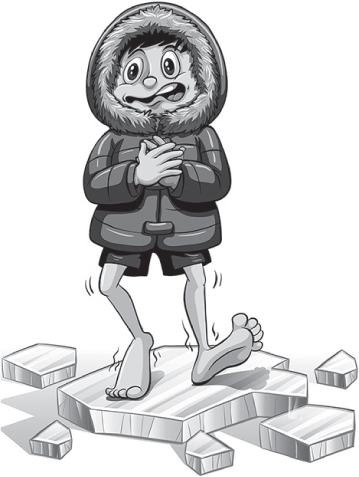
Often used in relation to marriage, cold feet has literary beginnings. It is thought to have been first used in the 1862 novel Seed-Time and Harvest by the German writer Fritz Reuter. In that book, a card player on a bad streak is fearful of losing all his money. Instead of conceding defeat and walking away with dignity, he withdraws from the game claiming that his feet are cold, making him unable to concentrate. The phrase eventually came to mean backing out of any situation through a loss of nerve.
![]()
MEANING: a competitor that is unknown or wins unexpectedly
IN CONTEXT: I never thought Kenny had it in him to run a marathon. He’s a real dark horse.
The expression dark horse originated with Benjamin Disraeli, the 19th-century British politician and writer who twice became Prime Minister. In his 1831 novel The Young Duke, Disraeli describes a horse race where the two favorites are beaten by a rank outsider. “A dark horse, which had never been thought of, rushed past the grand stand in sweeping triumph.” It was common in the racing industry at the time for owners to conceal their fastest horses until the day of the race, and because of Disraeli’s book, they became known as dark horses. The figurative usage soon followed.
Between You, Me, and the Lamppost
![]()
MEANING: a secret between two people
IN CONTEXT: Between you, me, and the lamppost, Matt is going to get fired tomorrow.
Between you, me, and the lamppost is yet another expression that stems from the 19th century and the British writer Charles Dickens. The lamppost in the saying represents the epitome of deafness, making clear that apart from the two people concerned, nobody else can know the information. It was first used by Dickens in his 1838 book Nicholas Nickleby.
![]()
MEANING: a trust in the unknown where the outcome can’t be predicted
IN CONTEXT: I allowed the carpenter to build my house without having any plans. It required a leap of faith on my part.
Leap of faith has literary origins and began as a “great leap in the dark.” Thomas Hobbes of Malmesbury was an English philosopher who suffered a stroke and died in 1679. His final words were, “Now I am about to take my last voyage, a great leap in the dark.” A few years later, in 1697, Sir John Vanbrugh wrote the comedy The Provoked Wife. It contained the line “Now I am for Hobbes’ voyage, a great leap in the dark.” It was this reference that popularized the expression, which was then quoted by many other writers before it changed into a leap of faith to describe any uncertainty.
![]()
MEANING: one’s actions are being monitored by the authorities
IN CONTEXT: You have to be careful what you search for on the Internet these days, as Big Brother is always watching.
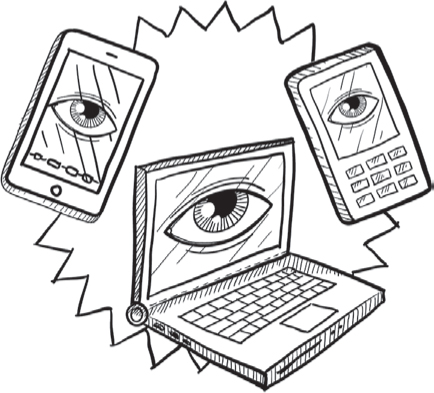
Big brother is watching has become a commonplace expression in recent years because of the popular reality television show. The phrase was born in 1949 with George Orwell’s novel Nineteen Eighty-Four. Big Brother is the leader of a totalitarian state in the book, where every citizen is under continual surveillance by the government. Telescreens are used to monitor the people, who are reminded of this by the slogan “Big Brother is watching you” being on constant display.
![]()
MEANING: to eat everything that someone has in the house
IN CONTEXT: That huge dog is eating me out of house and home.
Eat me out of house and home is another expression coined by the great bard William Shakespeare. In his historical play Henry IV, Part 2, written in 1599, one of the characters, Mistress Quickly, drags the rotund Sir John Falstaff before the court to seek compensation. In making her case she says, “It is more than for some, my lord; it is for all, all I have. He hath eaten me out of house and home; he hath put all my substance into that fat belly of his: but I will have some of it out again, or I will ride thee o’nights like the mare.”
![]()
MEANING: used to describe an absolute certainty
IN CONTEXT: As sure as eggs, she’ll be back here asking for more money tomorrow.
As sure as eggs is a contraction of the longer expression “as sure as eggs is eggs.” It is a corruption of the logical mathematical formula “× = ×,” and is purposely grammatically incorrect: the phrase should read “as sure as eggs are eggs.” It is not known how “× = ×” became “eggs is eggs,” but Charles Dickens used the phrase in his 1837 book The Pickwick Papers, and it became a popular expression from that time.
![]()
MEANING: a “no-win” situation; an impossible dilemma
IN CONTEXT: Professional bull riding is a catch-22. You have to stay on for eight seconds, but the bull has to be so aggressive that it’s almost impossible to ride for that long.
Catch-22 originated with the 1961 book of that name by Joseph Heller. Set on a US air force base during World War II, the pilots were desperate to be exempted from flying any more dangerous missions. The catch was that the pilots must be mad to fly another mission, but by applying for an exemption on the grounds of insanity, the applicant proved himself to be sane. Either way he had to continue flying. The title began as Catch-18 and went through various different numbers before Heller settled on Catch-22. The phrase quickly came to mean any impossible dilemma or paradoxical situation.
![]()
MEANING: falling down ill or dead in large numbers; a swift decline in numbers
IN CONTEXT: Five employees were off sick in the last week. They’re really dropping like flies.
Dropping like flies has its origins with “The Brave Little Tailor,” a German fairy tale by the Brothers Grimm. Dating from 1640, it tells the story of a tailor who is preparing to eat some jam. When flies land on his food, he kills seven of them with one blow of his hand. He makes a belt celebrating his achievement and puts the words “Seven at One Blow” on it. Inspired by this, he sets out to seek his fortune. While the phrase doesn’t actually appear in the text, the children’s story is believed to be the origin. The expression was in common usage by the early 1900s.
![]()
MEANING: to be very pleased with oneself and smile broadly without any inhibition
IN CONTEXT: Joel was so happy after winning the award that he couldn’t stop grinning like a Cheshire cat.
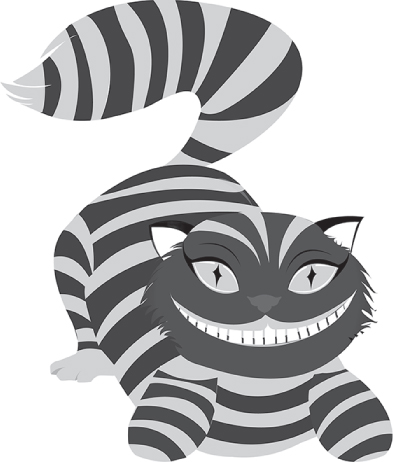
Grinning like a Cheshire cat has mixed origins. There is no such breed of feline, but the expression began because all cheeses produced in Cheshire, England, since the 12th century had the face of a grinning cat stamped on them (this is also thought to be the origin of the phrase “cheesy grin”). “Grinning like a Cheshire cat” was first expressed in words by Peter Pindar in his 1795 work A Pair of Lyric Epistles, but it wasn’t until 1865 that the saying reached worldwide popularity. That was in Lewis Carroll’s Alice’s Adventures in Wonderland, where the mysterious Cheshire Cat appears and disappears, gradually fading away until only its enormous grin remains.
![]()
MEANING: doing acts to attempt to gain favor or support
IN CONTEXT: An election was looming so the government lowered taxes in an attempt to curry favor with the voters.
Having nothing to do with Indian food, curry favor has its origins in the 1310 French poem by Gervais du Bus entitled “Le Roman de Fauvel” (which translates to “The Romance of Fauvel”). When someone grooms and dresses a horse it is known as “currying.” In the poem, Fauvel was the name of a vain and ambitious half-man, half-horse who deceives the leaders of the state. In order to bow to Fauvel and keep on his good side, the people would stroke and groom his coat—they were “currying Fauvel.” Eventually, this became currying favor.
![]()
MEANING: what you don’t know won’t hurt you
IN CONTEXT: I never knew eating too much salt was bad for you. Ignorance is bliss, I suppose.
Ignorance is bliss derives from the world of poetry. Thomas Gray was an 18th century English poet and professor at Cambridge University. In his 1742 poem “Ode on a Distant Prospect of Eton College” he wrote, “Thought would destroy their paradise. No more where ignorance is bliss, tis folly to be wise.” It was that poem that brought about the expression that is so common today.
![]()
MEANING: to leave for some unmentioned purpose, usually to go to the toilet
IN CONTEXT: Uncle Pete didn’t want Tim to know where he was going, so he told Tim that he was going to see a man about a dog.
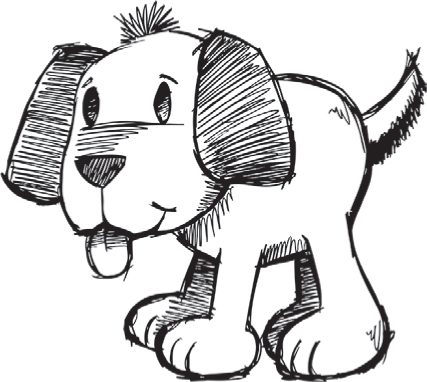
Go see a man about a dog has its origins in the theater. Flying Scud was a popular 1866 production by successful Irish playwright Dion Boucicault. On a number of occasions during the play, whenever the lead character found himself in an awkward situation that he wanted to get out of, he would say “I’ve got to go see a man about a dog.” This was met with much amusement by audiences. The play was shown in both London and New York, and people soon copied the expression to comic effect when they didn’t want to disclose their whereabouts.
![]()
MEANING: someone who is virtuous in a smug manner
IN CONTEXT: Jane never did anything wrong at school and she always smiled when we got into trouble. She was such a goody-two-shoes.
Goody-two-shoes derives from the 1765 children’s book The History of Little Goody-Two-Shoes, written by Oliver Goldsmith. It tells the story of Margery Meanwell, an orphan who can only afford one shoe. She is given a pair of shoes by a rich man, and in her excitement, delightedly exclaims “Two shoes, two shoes!” She repeats this to everyone she meets, earning her the nickname “Goody-Two-Shoes.” She eventually finds fortune by marrying a wealthy widower. The expression came to mean anyone who was piously virtuous by the early 20th century.